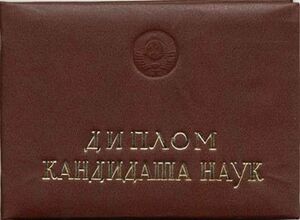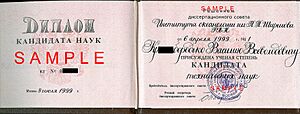Candidate of Sciences facts for kids
A Candidate of Sciences is a special university degree. It's like the first step of a doctoral degree in countries like Russia and some others that used to be part of the Soviet Union.
Think of it as a very high level of education. It's officially recognized around the world as a "doctoral or equivalent" degree. In many countries, it's seen as similar to a Doctor of Philosophy (Ph.D.), especially in science subjects. These countries also have an even higher degree called Doctor of Sciences.
Contents
What is the Candidate of Sciences Degree?
This degree was first created in the USSR (Soviet Union) in 1934. Before that, after the October Revolution in 1917, all old university degrees were removed. The Soviet government wanted to create new academic titles.
To get a Candidate of Sciences degree, you usually need to have a Master's degree first. A Master's degree usually takes one or two years of study after a four-year Bachelor's degree.
The Candidate of Sciences degree then requires at least three more years of full-time study. During this time, you must do your own original research. This research needs to be important or have practical uses.
In these countries, if you want to become a full university professor, you usually need the even higher Doctor of Sciences degree. This is similar to how some other countries require more research even after a Ph.D.
How to Get the Degree
Work for the Candidate of Sciences degree is often done during a special study period. This period is called aspirantura. You can do this at a university or a science research center.
Sometimes, you can even get the degree based on your published research papers. You don't always have to write a full thesis. If you are doing experimental science, your research must be published. You need at least three papers in scientific journals that are reviewed by other experts.
Before you can defend your main research project, you have to pass some special exams. These are called the "candidate minimum." They usually include exams in your specific field of study. You also need to pass exams in philosophy and a foreign language.
The most important part is presenting your research. This is called "defending" your dissertation. You present it to a group of experts called the Dissertation Council. This council has about 20 leading specialists in your field.
Before the defense, a summary of your research is published. This summary is called "autoreferat." It is sent to other research groups and libraries. You also need a "research supervisor" who guides your work.
During the defense, you explain your research to the council. Other experts, called "opponents," will give their opinions. You then answer questions from the opponents and the council members.
If most of the council members vote yes (at least 66.6%), your degree is recommended. It then needs to be approved by a central government board. This board is called the Higher Attestation Commission (VAK). However, some top universities and research centers can now approve degrees themselves.
Where is This Degree Used?
Former Czechoslovakia
In Czechoslovakia, the Candidate of Sciences degree was very similar to the Soviet one. It was introduced in 1953. The requirements were exactly the same as in the USSR.
The short form for this degree is CSc. It is written after the person's name, like "Dr. Anna Nováková, CSc."
There were other "Dr." degrees too, but they were different from a Ph.D. For example:
- JUDr. was for law.
- PhDr. was for philosophy.
- RNDr. was for natural sciences.
These degrees were given after a Master's degree and defending a special thesis.
There were also medical degrees:
- MUDr. was for general medicine.
- MVDr. was for veterinary medicine.
A special degree called RSDr. was given during the Communist era. It was mainly for people involved with the Communist Party.
Czech Republic
The CSc. degree was stopped in the Czech Republic in 1998. It was replaced by the Ph.D. degree. To get a Ph.D., you need a Master's degree. Then you enroll in a three-year program and defend your research.
Slovakia
In Slovakia, the Candidate degree was also stopped in 1996. It was replaced by the Ph.D. degree. The requirements are similar to those in the Czech Republic.
Poland
In Poland, the Ph.D. equivalent has always been called "doktor." For a short time between 1951 and 1958, the government tried to use "kandydat nauk." This was to follow the Soviet system.
Russia and Belarus
In the USSR, and now in Russia and Belarus, you need to publish at least three scientific papers. At least one of these papers must be in a journal approved by the Higher Assessment Commission (VAK). In Belarus, all three must be in VAK-approved journals.
In 1971, there were about 249,200 scientists with the Candidate degree.
Many countries recognize the Candidate of Sciences degree as a first doctoral degree. If a country only has one doctoral degree, the Candidate of Sciences is often seen as equal to it.
Ukraine
In Ukraine, the Candidate of Sciences degree was replaced by the Ph.D. degree in 2014. The new law says that the Candidate of Sciences degree is now considered equal to a Ph.D.
Students who started their Candidate of Sciences programs before 2015 can still finish them. They can still get the Candidate of Sciences degree. Since 2014, Ukrainian Candidate of Sciences diplomas also mention the Ph.D. equivalent in English.
Types of Science Degrees
When you get a Candidate degree in Russia, it will specify your field of study. Here are some examples of the types of sciences:
- Agricultural sciences
- Architecture
- Art criticism
- Biological sciences
- Chemical sciences
- Economic sciences
- Engineering sciences
- Geographic sciences
- Historical sciences
- Medical sciences
- Philosophical sciences
- Physical and mathematical sciences
- Psychological sciences
- Sociological sciences
- Veterinary sciences
Sometimes, a specific research topic can fit into different science categories. For example, physical chemistry research could lead to a degree in physical-mathematical, technical, or chemical sciences. But for each research project, only one type of science is chosen for the degree.
See also
- Doctor of Philosophy
- Doktor nauk
- Education in Belarus
- Education in Russia
- Education in Ukraine
 | William M. Jackson |
 | Juan E. Gilbert |
 | Neil deGrasse Tyson |



